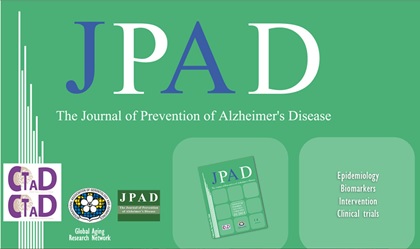
Citation :
Walker C.S., et al., (2025). Protocol for an intergenerational randomized controlled trial to enhance physical activity in older adults at risk for Alzheimer’s disease. Journal of Prevention of Alzheimer’s disease, https://doi.org/10.1016/j.tjpad.2024.100039
Full text : Here
Walker C.S., Noriega de la Colina A.E., Li L., Boulanger C., Thovinakere N., Noly-Gandon A., Barnoin G., Bennett M., Caplan J., Côté L., Elbaz S., Fock Ka Bao, S., Kara R., Lavoie N., Nguyen M., Otaner F., Pallett-Wiesel H., Victoria Piché J., Powers A., Ricciardelli S., Williams K., Déry C., Tremblay-Mercier J., Poirier J., Villeneuve S., Kramer A F., Geddes M R., The PREVENT-AD Research group.
published in Journal of Prevention of Alzheimer’s Disease, January 2025.
ABSTRACT: Background: Physical inactivity is one of the most important modifiable risk factors for Alzheimer’s disease in North America. Despite this, most older adults are physically inactive. It is currently unknown how to successfully motivate physical activity behavior in older adults at risk for Alzheimer’s disease, and this knowledge is crucial for early and effective disease prevention. Prior research has shown that intergenerational social engagement and prosocial behaviours can enhance the health and well-being of older adults. Objectives: This manuscript describes the design of a randomized controlled trial that will test the efficacy of a behavioral intervention to enhance physical activity in older adults at risk for Alzheimer’s disease. Design/setting: This is a single-blinded, two-arm stratified randomized controlled trial that incorporates a hybrid efficacy and implementation design. Participants are randomized to an intervention or control condition in a 1:1 ratio and are stratified by a multimodal Alzheimer’s disease risk score. All study visits are conducted remotely through videoconferencing. Participants: The study aims to recruit 60 older adults with a first-degree family history of Alzheimer’s disease from the PREVENT-AD cohort and 30 younger adults who are paired with older adults in the intervention condition. Intervention: Older participants in the intervention group will be paired with younger study partners and receive positive, daily messages over four weeks using a novel technology platform. The daily messages combine intergenerational social engagement (growing a virtual garden with a younger study partner) and prosocial goals (donations to charity after reaching step count goals). Measurements: The primary outcome is change in step count compared to baseline measured using a wrist-worn triaxial accelerometer. Secondary outcomes include time spent physically active, mood, generativity, loneliness, and cognition. Target mechanisms (social support and generativity) of physical activity engagement will be examined. Ease of use, acceptability, and feasibility of the technology as well as barriers and facilitators of participation will be assessed. Conclusions: This research will advance our understanding of mechanisms and individual differences underlying successful physical activity engagement in older adults who are at risk for Alzheimer’s disease. This knowledge will contribute to strategies for promoting health behaviours that can prevent the risk of Alzheimer’s disease.
